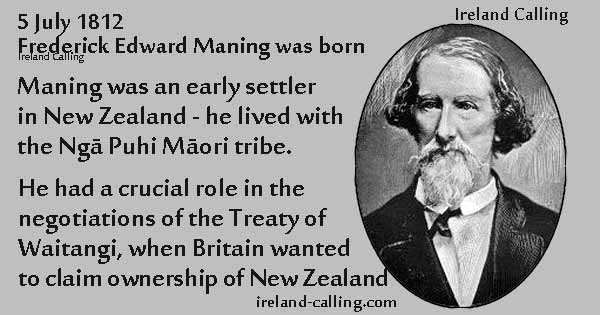Frederick Edward Maning was born in Ireland but rose to prominence as one of the early settlers in New Zealand. He won the trust of the native Maori people and helped them negotiate with the British, who were colonising the country in the mid-19th century.
He published two books, Old New Zealand and History of the War in the North of New Zealand against the Chief Heke, which have become part of the country’s classic literature.

Frederick Maning was born in Dublin on 5 July, 1812 into a prosperous Protestant family. He was taken to Australia as a child when his father moved to Van Diemen’s Land to take up farming.
The family then moved to Hobart and as a teenager Maning definitely witnessed, and possibly took part in, the Black War as European settlers forced the Aborigines from their land.
Maning reportedly never spoke of this period in his life, and it is unknown what he did or saw. What is known is that the Europeans were accused of committing atrocities against the native people.
As an adult, Maning moved to New Zealand and lived amongst the native Ngā Puhi Māori tribe. He was a strong athletic man, standing more than six feet tall.
He was also a skilled outdoorsman and proved to be a welcome addition to the Ngā Puhi Māoris. They named him Pākehā Māori, which meant a European turned native. Maning was happy and bought a plot of land in Hokianga in 1839. He then married a Maori woman and started a family.
In 1840, Maning played a crucial part in the negotiations of the Treaty of Waitangi, when Britain wanted to claim ownership of New Zealand. Maning had a unique position as a man of European background now living as a native New Zealander.
He had the respect of both the Maoris and the British authorities.
He advised the Maoris not to sign, as he warned that allowing the Europeans to colonise would destroy their cultures and tradition. The British said they would protect the Maori tribes from unlawful settlers taking the land by force.
Most of the Maori chiefs in New Zealand signed the treaty but some did refuse. A series of conflicts followed as the British tried to take control of the land.
Many Maoris that had signed the treaty offered their support to the government in removing those tribes that had refused.
Maning acted as a peacemaker on more than one occasion to try and prevent any unnecessary bloodshed, usually by encouraging the Maoris to concede to the British.
After the Maori Wars ended and the natives and settlers began integrating, Maning took a position of Native Land Court Judge.
His experiences allowed him to see both sides of disagreements between natives and settlers. He held the position for more than ten years before his retirement.
In 1882, Maning travelled to London for an operation but died of cancer during his stay on 25 July, 1883. In line with his wishes, his body was returned to New Zealand to be buried.
Maning wrote two books, Old New Zealand and History of the War in the North of New Zealand against the Chief Heke. Both have become classics of New Zealand literature.
Click here to read about more Irish writers
More popular articles and videos
The real life mystery of what Maureen O’Hara whispered to make John Wayne look so shocked
Matt Damon winning hearts and minds with charm assault on Ireland
Action hero Tom Cruise was once attacked by an old man in a Kerry pub
Liam Neeson speaks about his late wife in emotional interview
Dating site explains why Irish men make wonderful husband material
Billy Connolly says public should ignore politicians and listen to comedians
Take a look inside Hollywood star Saoirse Ronan’s stunning Irish home
